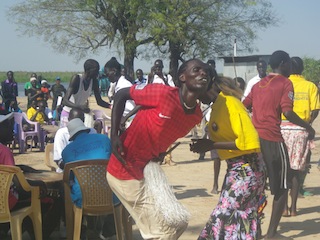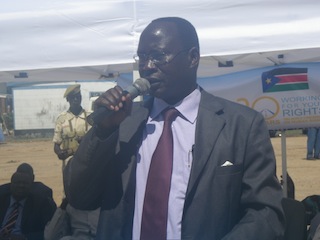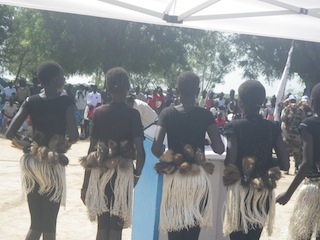Jonglei promises to promote human rights
December 11, 2013 (BOR) – The government of South Sudan’s troubled Jonglei state marked world human rights days on Wednesday by pledging to curb abuses over the next year.

South Sudan seceded from Sudan in 2011 after decades of civil war with various Khartoum governments. However, the rebels-turned-ruling party and national army have struggled to usher in the freedoms fought for during the conflict.
“We will not practice the evil things that were practised on our people by Northerners”, Chol said, .
Many cases of human right abuses have been committed on the civilians by the South Sudanese army in Jonglei since a state-wide disarmament campaign was launched in March 2012 following severe violence between cattle herding groups, which displaced over 100,000 people.
In October a military court sentenced five soldiers to the death penalty for killing civilians in Jonglei while two soldiers were given prison sentences after being found guilty of rape.
A further 24 members of the Sudan People’s Liberation Army (SPLA) were charged with misconduct due to frequent drinking while deployed or on duty.
During the height of the disarmament campaign over 10,000 soldiers and police were deployed to Jonglei, where the army has also been fighting rebellion in Pibor county led by David Yau Yau, which has continued – with a interlude when he accepted a presidential amnesty – since he failed to become a state-level MP in the 2010 elections.

Human Rights Watch reported in September that SPLA soldiers have targeted civilians from Yau Yau’s Murle ethnic group. According to the report there were “24 incidents of unlawful killings of almost 100 members of the Murle ethnic group between December 2012 and July 2013, constituting serious violations of international humanitarian and human rights law”.
GIRLS EDUCATION
Jonglei state’s minister of cabinet affairs, Gabriel Gai Riam, told the crowd who attended the celebration that poverty and lack of education opportunities for girls must me addressed.

According to Gai, girls often do not finish their education as they are married or forced to work by their families. Under South Sudanese law girls are not supposed to marry before the age of 18 but this is often ignored due to financial pressures with bride prices providing families with money and livestock.
“Fifty percent of our girls in South Sudan are married before reaching the age of eighteen, preventing of them from receiving education and having equal opportunities with men. Until we achieve equal value for boys and girls, our societies will not reach [our] peaceful potential”, Gai explained.
(ST)
